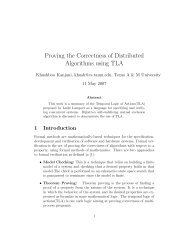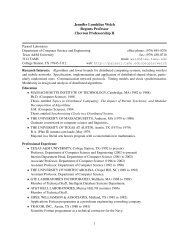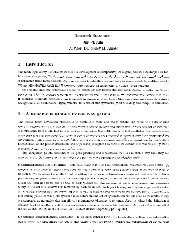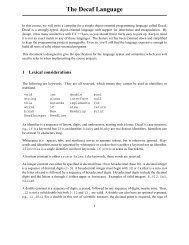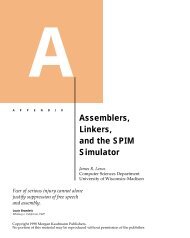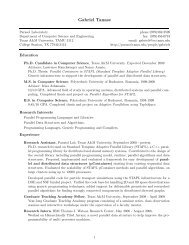Hoard: A Scalable Memory Allocator for Multithreaded Applications
Hoard: A Scalable Memory Allocator for Multithreaded Applications
Hoard: A Scalable Memory Allocator for Multithreaded Applications
You also want an ePaper? Increase the reach of your titles
YUMPU automatically turns print PDFs into web optimized ePapers that Google loves.
program<br />
fragmentation<br />
f = 1/8 f = 1/4 f = 1/2<br />
threadtest 1.22 1.24 1.22<br />
shbench 3.17 3.17 3.16<br />
Larson 1.22 1.22 1.61<br />
BEMengine 1.02 1.02 1.02<br />
Barnes-Hut 1.18 1.18 1.18<br />
Table 6: Fragmentation on 14 processors using <strong>Hoard</strong> with different<br />
empty fractions.<br />
6.1 Taxonomy of <strong>Memory</strong> <strong>Allocator</strong> Algorithms<br />
Our taxonomy consists of the following five categories:<br />
Serial single heap. Only one processor may access the heap at a<br />
time (Solaris, Windows NT/2000 [21]).<br />
Concurrent single heap. Many processors may simultaneously operate<br />
on one shared heap ([5, 16, 17, 13, 14]).<br />
Pure private heaps. Each processor has its own heap (STL [30],<br />
Cilk [6]).<br />
Private heaps with ownership. Each processor has its own heap,<br />
but memory is always returned to its “owner” processor (MTmalloc,<br />
Ptmalloc [9], LKmalloc [22]).<br />
Private heaps with thresholds. Each processor has its own heap<br />
which can hold a limited amount of free memory (DYNIX<br />
kernel allocator [25], Vee and Hsu [37], <strong>Hoard</strong>).<br />
Below we discuss these single and multiple-heap algorithms, focusing<br />
on the false sharing and blowup characteristics of each.<br />
Single Heap Allocation<br />
Serial single heap allocators often exhibit extremely low fragmentation<br />
over a wide range of real programs [19] and are quite fast<br />
[23]. Since they typically protect the heap with a single lock which<br />
serializes memory operations and introduces contention, they are<br />
inappropriate <strong>for</strong> use with most parallel multithreaded programs.<br />
In multithreaded programs, contention <strong>for</strong> the lock prevents allocator<br />
per<strong>for</strong>mance from scaling with the number of processors. Most<br />
modern operating systems provide such memory allocators in the<br />
default library, including Solaris and IRIX. Windows NT/2000 uses<br />
64-bit atomic operations on freelists rather than locks [21] which is<br />
also unscalable because the head of each freelist is a central bottleneck<br />
2 . These allocators all actively induce false sharing.<br />
Concurrent single heap allocation implements the heap as a<br />
concurrent data structure, such as a concurrent B-tree [10, 11, 13,<br />
14, 16, 17] or a freelist with locks on each free block [5, 8, 34].<br />
This approach reduces to a serial single heap in the common case<br />
when most allocations are from a small number of object sizes.<br />
Johnstone and Wilson show that <strong>for</strong> every program they examined,<br />
the vast majority of objects allocated are of only a few sizes [18].<br />
Each memory operation on these structures requires either time linear<br />
in the number of free blocks or O(log C) time, where C is the<br />
number of size classes of allocated objects. A size class is a range<br />
of object sizes that are grouped together (e.g., all objects between<br />
32 and 36 bytes are treated as 36-byte objects). Like serial single<br />
heaps, these allocators actively induce false sharing. Another<br />
problem with these allocators is that they make use of many locks<br />
2 The Windows 2000 allocator and some of Iyengar’s allocators use<br />
one freelist <strong>for</strong> each object size or range of sizes [13, 14, 21]<br />
or atomic update operations (e.g., compare-and-swap), which are<br />
quite expensive.<br />
State-of-the-art serial allocators are so well engineered that most<br />
memory operations involve only a handful of instructions [23]. An<br />
uncontended lock acquire and release accounts <strong>for</strong> about half of the<br />
total runtime of these memory operations. In order to be competitive,<br />
a memory allocator can only acquire and release at most two<br />
locks in the common case, or incur three atomic operations. <strong>Hoard</strong><br />
requires only one lock <strong>for</strong> each malloc and two <strong>for</strong> each free and<br />
each memory operation takes constant (amortized) time (see Section<br />
3.4).<br />
Multiple-Heap Allocation<br />
We describe three categories of allocators which all use multipleheaps.<br />
The allocators assign threads to heaps either by assigning<br />
one heap to every thread (using thread-specific data) [30], by using<br />
a currently unused heap from a collection of heaps [9], round-robin<br />
heap assignment (as in MTmalloc, provided with Solaris 7 as a replacement<br />
allocator <strong>for</strong> multithreaded applications), or by providing<br />
a mapping function that maps threads onto a collection of heaps<br />
(LKmalloc [22], <strong>Hoard</strong>). For simplicity of exposition, we assume<br />
that there is exactly one thread bound to each processor and one<br />
heap <strong>for</strong> each of these threads.<br />
STL’s (Standard Template Library) pthread alloc, Cilk 4.1, and<br />
many ad hoc allocators use pure private heaps allocation [6, 30].<br />
Each processor has its own per-processor heap that it uses <strong>for</strong> every<br />
memory operation (the allocator mallocs from its heap and frees to<br />
its heap). Each per-processor heap is “purely private” because each<br />
processor never accesses any other heap <strong>for</strong> any memory operation.<br />
After one thread allocates an object, a second thread can free it; in<br />
pure private heaps allocators, this memory is placed in the second<br />
thread’s heap. Since parts of the same cache line may be placed on<br />
multiple heaps, pure private-heaps allocators passively induce false<br />
sharing. Worse, pure private-heaps allocators exhibit unbounded<br />
memory consumption given a producer-consumer allocation pattern,<br />
as described in Section 2.2. <strong>Hoard</strong> avoids this problem by<br />
returning freed blocks to the heap that owns the superblocks they<br />
belong to.<br />
Private heaps with ownership returns free blocks to the heap that<br />
allocated them. This algorithm, used by MTmalloc, Ptmalloc [9]<br />
and LKmalloc [22], yields O(P ) blowup, whereas <strong>Hoard</strong> has O(1)<br />
blowup. Consider a round-robin style producer-consumer program:<br />
each processor i allocates K blocks and processor (i + 1)modP<br />
frees them. The program requires only K blocks but the allocator<br />
will allocate P ∗ K blocks (K on all P heaps). Ptmalloc and<br />
MTmalloc can actively induce false sharing (different threads may<br />
allocate from the same heap). LKmalloc’s permanent assignment<br />
of large regions of memory to processors and its immediate return<br />
of freed blocks to these regions, while leading to O(P ) blowup,<br />
should have the advantage of eliminating allocator-induced false<br />
sharing, although the authors did not explicitly address this issue.<br />
<strong>Hoard</strong> explicitly takes steps to reduce false sharing, although it cannot<br />
avoid it altogether, while maintaining O(1) blowup.<br />
Both Ptmalloc and MTmalloc also suffer from scalability bottlenecks.<br />
In Ptmalloc, each malloc chooses the first heap that is not<br />
currently in use (caching the resulting choice <strong>for</strong> the next attempt).<br />
This heap selection strategy causes substantial bus traffic which<br />
limits Ptmalloc’s scalability to about 6 processors, as we show in<br />
Section 5. MTmalloc per<strong>for</strong>ms round-robin heap assignment by<br />
maintaining a “nextHeap” global variable that is updated by every<br />
call to malloc. This variable is a source of contention that makes<br />
MTmalloc unscalable and actively induces false sharing. <strong>Hoard</strong> has<br />
no centralized bottlenecks except <strong>for</strong> the global heap, which is not a



